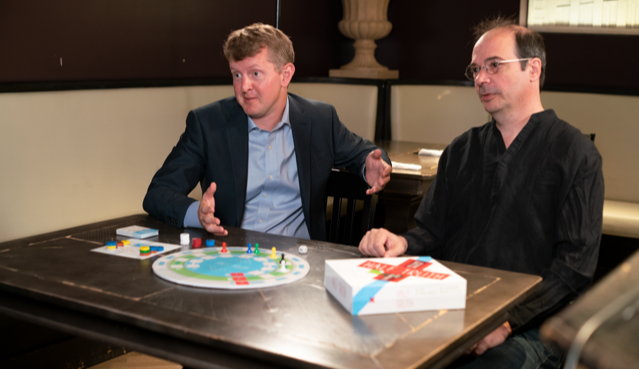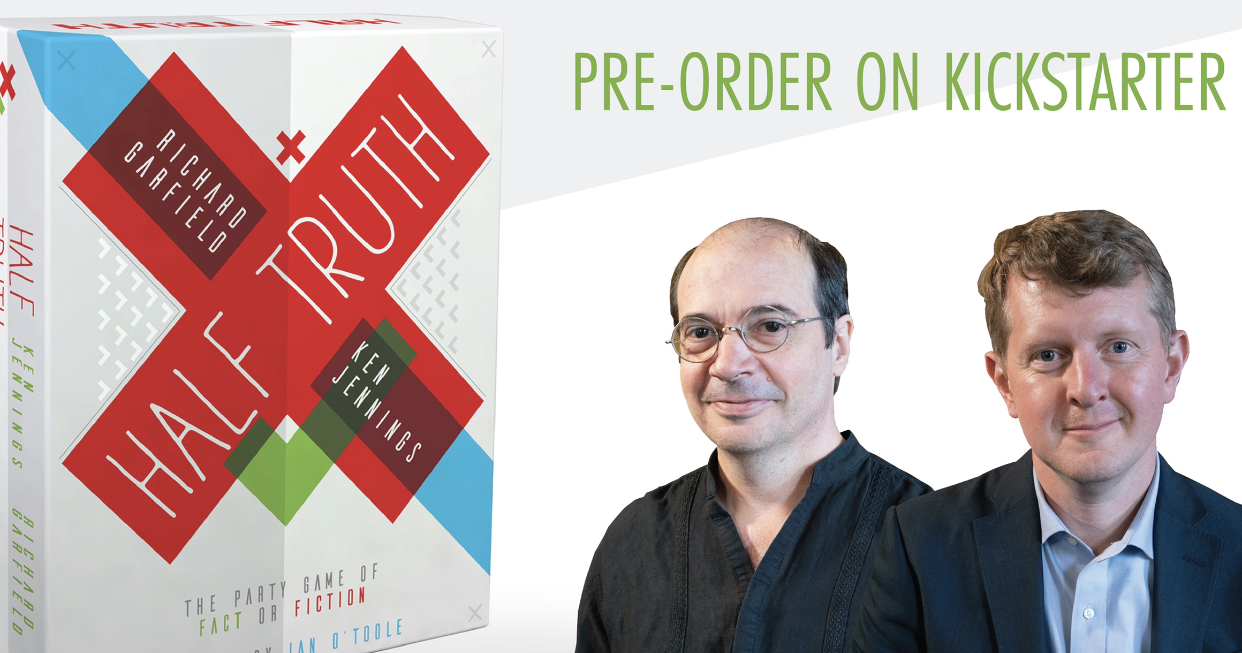What do you get when you pair the creator of Magic: The Gathering, Richard Garfield with Jeopardy! World Champion, Ken Jennings? Turns out, it’s a brand new board game currently on Kickstarter called Half Truth.
Produced by Studio 71 along with Nighthawk Games, Half Truth will be the go to game on game night when you want to see which one of your friends has the bigger brain. With Ken Jennings crafting the questions and Richard Garfield creating the board game infrastructure, Half Truth is the perfect choice to show off your knowledge (and learn some new facts as well).
I was lucky enough to talk to Richard and Ken about working together on Half Truth as well as all things board game related.

GameSkinny: From Jeopardy genius to board game creator, what drew you to create Half Truth with Richard? What challenges did you and Richard face while creating the game?
Ken Jennings: Richard is a game legend, so when he tracked me down to ask if I wanted to work on a trivia game with him, it was a real highlight. It was like King Arthur asking you to join the Round Table.
The big challenges for me in editing all the trivia in the game were, first, to make sure there were no factual goofs, because that would be embarrassing, and I’d get angry emails from unforgiving, pedantic trivia fans, and second, to make sure the game had a question for just about anything someone could be a well-informed “geek” about nowadays. Hairstyles, punctuation, pastries, reality TV … we wanted to make sure that whatever your thing is, the game has a question about it.
While the game has the trivia master in Ken Jennings, the other side of the duo is no stranger to the card game genre. Richard Garfield is the creator of Magic: The Gathering, which is one of the most successful card games ever!
GS: Magic: The Gathering is one of the most popular card games in the world, what brought you to create a knowledge-based board game?
Richard Garfield: I am interested in all games, and I encourage all new designers to play games outside their comfort zone and learn what makes them appealing to their fans. After reading Braniac, I realized I hadn’t done that for trivia games in any serious way, and Ken’s book jump started me down that path. Of course, I had played such games before, but I had viewed them as narrow games that were dominated by players with useless knowledge.
Braniac got me to view such games as, potentially, at least, a lot broader than I had before — where every player has a chance to shine, since everyone has their own unique knowledge. It also made me realize not all trivia questions are a matter of, “I have the knowledge or I don’t.” The best questions can involve leaps of intuition and metagaming and educated guesses.
When you see Ken Jennings and trivia in the same sentence, you tend to think of his historic stint on Jeopardy!. For Half Truth, I was wondering if we were going to be answering simple questions or ones that you would see during Final Jeopardy.
GS: What style of questions can players expect to be stumped by when they play the game? Is there a large variety of difficulty between questions? Are they just generic trivia questions or are they separated into broad categories?
KJ: The game works like this: each card has a category on it, like “Animals with blue tongues.” Then there are six possible answers listed, three right and three wrong, and players have to place bets on which answers they believe are the true ones.
If you’re the trivia know-it-all in the room, you obviously have an edge, but everyone can play along on every question and have a good time. I think people will be surprised by how well they do. We’re all smarter than we think.
GS: What was it like working with Ken on Half Truth? What were some of the challenges that you faced while creating the game?
RG: It was great working with Ken; he was very open to learning what worked best for the special form of question we have in Half Truth; and he was good at sharing his broad knowledge of trivia question construction to educate us to make them even better. And, as I suspected from his books, his tone had an excellent amount of humor and playfulness for our needs.
The biggest challenge in the game’s creation was probably that our skill at making questions increased throughout to the point that we had to constantly go back and improve what we had done before.
Board games are meant to play with friends. Some board games (Monopoly) take friendships to a whole new level by destroying them. Where does Half Truth lie on that scale?
GS: Will friendships be broken because of this game like other board games, or is this game more of a learning experience to give you more knowledge just in case they get their shot on Jeopardy!?
KJ: Jeopardy! is cutthroat! This is a comparatively chill party game. I hate playing a trivia game and feeling stupid on half the cards. This is a trivia game designed to make people feel smart.
If your friendships suffer, that’s a personal issue of your own, and Richard and I accept no legal liability.
GS: Is this a game to show off how smart you are to your friends? Or is it a game where you can learn new info as you play?
RG: It is both. There is a wide range to the sorts of questions, and everyone should be able to find something they have unique knowledge of. Also, every question has three true and three false answers, so you have a 50% chance of answering correctly even if you know nothing, but a lot of the time, you will be able to improve those odds even if you aren’t 100% certain.
For example, Words in Lady Gaga’s “poker Face:” a) Moolah b) Chess c) Muffin d) Russian e) End f) Spades. Here, someone who knows the song can get all three correct for a nice bonus. Someone like me has heard the song but doesn’t know any words outside “m-m-m-m-y poker face,” but I still have hooks into the question, I can make educated guesses on what isn’t a word and what is likely to be among the many words I don’t know.
I could even see myself — if I was behind and needed to press my luck — guessing two of them. I really can’t see myself guessing three unless it was my only chance to win the game.
GS: While card games always had a spot on store shelves, they have been starting to find a new home on phones and tablets.
Do you feel that the digital game is a lesser experience compared to being in person at tournaments? Or do the digital games offer a better experience and allow for people to enjoy the game and possibly migrate to the physical game as well?
RG: There are pros and cons. Nothing can replace getting together in a single room with friends and playing a game. It is a wonderful way to socialize and connect in this world where people are increasingly networked yet often increasingly physically isolated.
However, the convenience of having access to players any time, and having a moderator (the device) which takes care of all the busy work and makes sure everyone is playing correctly … these are real boons to a game player.
And, while I don’t think you can replace face to face game play, digital social worlds are meaningful in their own way — and their value can’t be discounted.
GS: Are there any inspirations from current board games or past experiences that helped you design this game?
KJ: A lot of it came from a childhood of watching Jeopardy! Jeopardy! taught me that trivia isn’t just retrieving facts, it can be like solving a puzzle or a riddle. You’re not just playing against your competitors; you’re trying to analyze and outsmart the person who wrote the clue.
I think Richard and I were also influenced by trivia games like Trivial Pursuit where everyone has to sit around and wait for one person to answer each card, which we hated. In Half Truth, everyone gets to play on every single question.
GS: What were some of the early prototype ideas for the game before you both agreed on the final design?
RG: The architecture of the game was complete before Ken was involved; and it took a few months of tinkering with ideas before I got that to a place I liked it. Of course, in a game like this most of the value is in the content you deliver with it — and Ken contributed around half the questions, and helped us identify what made questions work best.
You could say that I provided the hardware — the game rules — and Ken was the lead programmer.
When someone interviews Ken, you have a responsibility to try and stump him with some hard to answer questions. So I did my duty and tried.
GS: You are one of the most prolific game show contestants, and you are now creating a board game. Without using the internet, can you answer these board game-related questions? One: What was the European name of Chutes and Ladders before it came to the U.S?
KJ: Snakes and Ladders
GS: Correct! Two: Who was the original designer of Monopoly?
KJ: Ugh, I know this and can’t come up with the guy’s name. I thought about this all morning and eventually remembered that Alfred Butts is the name of the guy who invented Scrabble. I think I should get partial credit.
GS: Partial credit was given. The original designer of Monopoly was Elizabeth Magie. Three: What year was Settlers of Catan created?
KJ: I first played it in 1998, but I imagine it had been kicking around Germany for longer. 1996 maybe?
GS: It was originally created in 1995 by Klaus Teuber. Super close!
—
Whether you are a certified brainiac or you are looking for a new board game for your weekly game night, Half Truth is there to give you a challenge that will teach you some new fun facts as well.
You can support Half Truth on Kickstarter right. The game is expected to ship starting December 2019.
GameSkinny would like to thank Richard and Ken for taking the time to talk to us.








Published: Aug 19, 2019 01:38 pm